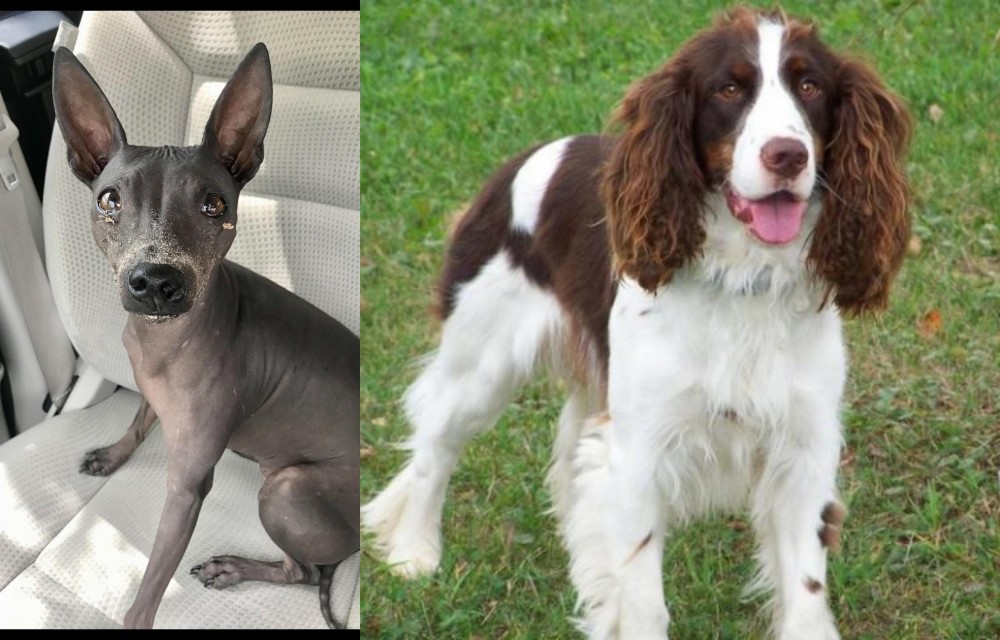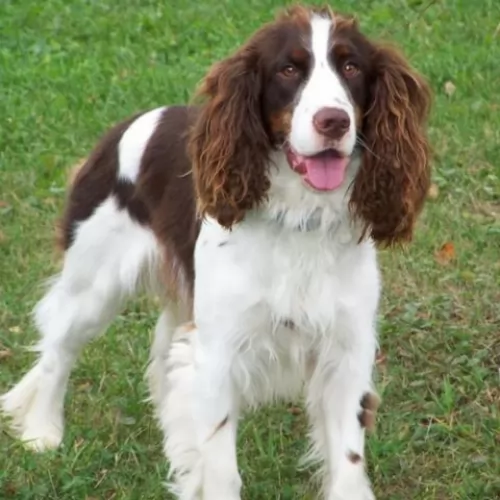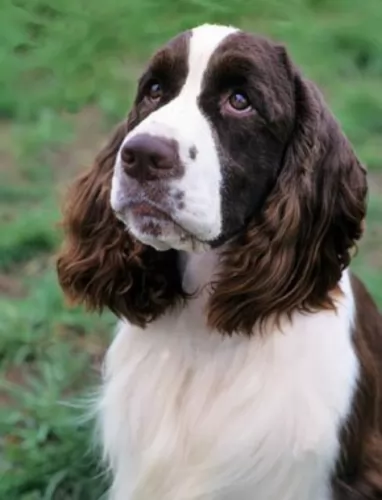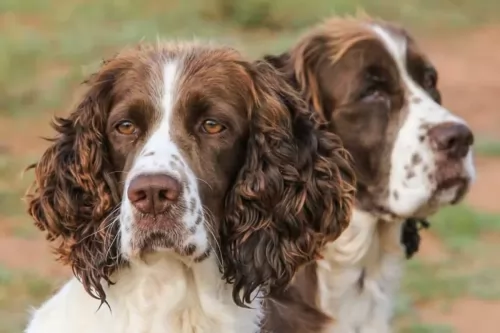 Petzlover
Petzlover American Hairless Terrier is originated from United States but English Springer Spaniel is originated from United Kingdom. American Hairless Terrier may grow 6 cm / 2 inches shorter than English Springer Spaniel. American Hairless Terrier may weigh 13 kg / 28 pounds lesser than English Springer Spaniel. Both American Hairless Terrier and English Springer Spaniel has almost same life span. American Hairless Terrier may have less litter size than English Springer Spaniel. Both American Hairless Terrier and English Springer Spaniel requires Low Maintenance.
American Hairless Terrier is originated from United States but English Springer Spaniel is originated from United Kingdom. American Hairless Terrier may grow 6 cm / 2 inches shorter than English Springer Spaniel. American Hairless Terrier may weigh 13 kg / 28 pounds lesser than English Springer Spaniel. Both American Hairless Terrier and English Springer Spaniel has almost same life span. American Hairless Terrier may have less litter size than English Springer Spaniel. Both American Hairless Terrier and English Springer Spaniel requires Low Maintenance.
 Derived from the Rat Terrier, the American Hairless Terrier was born in a litter of Rat Terriers in 1972.
Derived from the Rat Terrier, the American Hairless Terrier was born in a litter of Rat Terriers in 1972.
The evolution of this breed is very different from other hairless breeds. The American Hairless Terrier was independently developed when a hairless pup was produced in a litter of normal Rat Terriers. The owners of this pup, Edwin and Willie Scott attempted to breed her to other Rat terriers but were not successful in having another hairless pup until years later. Then they had a litter with one male and one female hairless puppy.
From that point on they worked with a veterinarian and a geneticist to develop the breed until it was accepted as a separate breed from the Rat Terrier in 2004 and accepted into the AKC in 2016.
The breed is very rare and with hairless dogs breeding only produces about two thirds of the litter as hairless and one third as coated. If a hairless is bred to a coated terrier, the chances of getting hairless puppies are 50% hairless and 50% coated. It is very rare to get a hairless when breed two coated terriers. The difference between the American Hairless Terrier and other hairless breeds is that the hairless gene in most breed is a lethal dominant gene, but in the AHT it is a recessive gene.
 The English Springer Spaniel is one of many gun dog breeds that flush and retrieve. They descended from the Shropshire Spaniels and Norfolk Spaniels. The English Springer Spaniel is somewhat similar to the Welsh Springer Spaniel and believe it or not they are also closely related to the English Cocker Spaniel. In the last century the cockers and springers came from the same parents. The larger dogs flushed game and made game “spring” from the brush while the smaller dogs – the “cockers” would hunt woodcock. Eventually through specific breeding, the UKC of England recognized the “springers” as a separate breed.
The English Springer Spaniel is one of many gun dog breeds that flush and retrieve. They descended from the Shropshire Spaniels and Norfolk Spaniels. The English Springer Spaniel is somewhat similar to the Welsh Springer Spaniel and believe it or not they are also closely related to the English Cocker Spaniel. In the last century the cockers and springers came from the same parents. The larger dogs flushed game and made game “spring” from the brush while the smaller dogs – the “cockers” would hunt woodcock. Eventually through specific breeding, the UKC of England recognized the “springers” as a separate breed.
Sydenham Edwards, in 1801, proposed that the spaniels be divided into the Springing or Hawking Spaniel and the Cocking or Cocker Spaniel. From this point on there was a flourish in the development of spaniel breeds in the 19th century. They were usually named for the county in which they were founded or after the individual who developed them. In 1902, the English Springer Spaniel was officially recognized as its own breed by the UKC. It was not until 1910 that the AKC recognized them as well.
 The American Hairless Terrier is similar to it’s breed of origin, the Rat Terrier, and the coated AHT looks very much like a Rat Terrier. They are small to medium in size, very muscular and have more refined features than the Rat Terrier. Their round eyes can be a variety of colors including amber, brown, grey, turquoise and blue. The tail is not docked but rather long and thin.
The American Hairless Terrier is similar to it’s breed of origin, the Rat Terrier, and the coated AHT looks very much like a Rat Terrier. They are small to medium in size, very muscular and have more refined features than the Rat Terrier. Their round eyes can be a variety of colors including amber, brown, grey, turquoise and blue. The tail is not docked but rather long and thin.
The AHT might have eyebrows and whiskers or they might only have whiskers. Their head is broad, and wedge shaped with upright ears. They are an energetic, social and intelligent dog.
 Among spaniels the English Springer is medium size and well compacted. Both the working dog and the show dog sport moderately long coats and a friendly tail. They both wear a gentle expression in their eyes. But there the commonality stops as the difference between the working English Springer Spaniel and the show line is greater in this breed than in any other. The gene pools have become almost separate over the last 70 years. If you put a field dog in the show ring they would not be able to compete. If you put a show line English Springer in the field, they would not have the stamina or speed for field trials.
Among spaniels the English Springer is medium size and well compacted. Both the working dog and the show dog sport moderately long coats and a friendly tail. They both wear a gentle expression in their eyes. But there the commonality stops as the difference between the working English Springer Spaniel and the show line is greater in this breed than in any other. The gene pools have become almost separate over the last 70 years. If you put a field dog in the show ring they would not be able to compete. If you put a show line English Springer in the field, they would not have the stamina or speed for field trials.
The field line has a coarser coat and less pendulous ears. They may dock a few inches off the tail, and they are much scruffier than the show dogs. On the other hand, the show dogs have dewlaps, pendant ears and dangling flews. They are heavier and thicker than the field dog. They have long muzzles, not so prominent eyes and docked tails. The English Springer Spaniel stands tall and proud, coming from an ancient line of Spaniels
 This is a curious, intelligent, little dog. They are terrific family dogs with a note to say they are better with older children than with younger. If they are raised with small children, then they are terrific with them. They are territorial, and the children become part of their territory. They will guard and protect them.
This is a curious, intelligent, little dog. They are terrific family dogs with a note to say they are better with older children than with younger. If they are raised with small children, then they are terrific with them. They are territorial, and the children become part of their territory. They will guard and protect them.
They need to play, and this is the biggest requirement for owners. Be sure you have time for them. This is not a couch potato dog. They have a lot of energy and can be destructive and “barky” if that energy is not dissipated. They are terriers through and through and love to “go to ground” whether going in holes they find or digging the holes themselves. They will go after small rodents like chipmunks. They need to be protected in these activities since their skin is vulnerable to scratches and cuts from brush. Their prey drive is strong, so it is important to protect them from themselves in this respect.
They are curious and feisty and every inch the terrier. Affectionate, friendly, and social it is also important to remember they can be scared easily, hurt if play is too rough, and this will trigger barking. They make very good watch dogs.
 The English Springer Spaniel is a friendly dog who loves to please his people. They are great family dogs, easy-going and affectionate. In addition, they are attentive and alert which makes them such great hunting dogs. With exceptional speed and stamina, he needs activity to stimulate his body and brain. He is very intelligent. That intelligence can lead to stubbornness as well. He’d great with kids and good with other pets with perhaps the exception of cats. The breed is in love with water and will get in at any time.
The English Springer Spaniel is a friendly dog who loves to please his people. They are great family dogs, easy-going and affectionate. In addition, they are attentive and alert which makes them such great hunting dogs. With exceptional speed and stamina, he needs activity to stimulate his body and brain. He is very intelligent. That intelligence can lead to stubbornness as well. He’d great with kids and good with other pets with perhaps the exception of cats. The breed is in love with water and will get in at any time.
 There are not many health problems bothering this sturdy little dog.
There are not many health problems bothering this sturdy little dog.
The American Hairless Terrier has limited breeding stock and it is still a rare breed. Its health problems are mostly related to its hairless state. The breed is highly susceptible to sunburn, rashes, pimples, and allergies. They often need clothing in all seasons to protect them from the heat of the sun or from the cold. The skin must be cleaned regularly often daily with soap and water. This is especially true if sunscreen is used as they are open to skin infections.
Hip dysplasia is also a common issue for this small breed.
 Not an uncommon issue for most medium to smaller sized dogs. It can lead to lameness or arthritis.
Not an uncommon issue for most medium to smaller sized dogs. It can lead to lameness or arthritis.
Loss of vision due to a deterioration of the retina.
Clubs form in the retinal tissue and can lead to blindness.
The twisting or distention of the stomach that effects dogs with deep chests and can lead to death if not treated immediately.
 The American Hairless Terrier has some food needs that might be different from other breeds. They should not be given food that contains soy, wheat or corn. They need to be fed at least 3-4 times a day in small amounts as puppies and twice a day as adult. Be sure to avoid overeating and obesity.
Puppies need about 400 calories a day whether you feed four times or two times. The adult American Hairless Terrier needs about 500-600 calories per day. This might be half a cup to a cup per day.
The American Hairless Terrier has some food needs that might be different from other breeds. They should not be given food that contains soy, wheat or corn. They need to be fed at least 3-4 times a day in small amounts as puppies and twice a day as adult. Be sure to avoid overeating and obesity.
Puppies need about 400 calories a day whether you feed four times or two times. The adult American Hairless Terrier needs about 500-600 calories per day. This might be half a cup to a cup per day.
As previously mentioned the American Hairless Terrier has skin health issues and is also prone to hip dysplasia.
This is a great breed for games if you make them small to match his size. He is energetic, athletic and playful. He loves agility, lure chasing and barn hunt activities. They need a good half hour of vigorous exercise per day.
 The English Springer Spaniel can gain weight easily and obesity is one of the biggest health issues for this breed. Feed them a high quality dry dog food. Working dogs need more energy and more calories than the inactive dog. An active member of the breed should have around 1353 calories every day in at least 2 meals if not 3. Do not feed a large meal before or after strenuous exercise as this can cause bloat.
The English Springer Spaniel can gain weight easily and obesity is one of the biggest health issues for this breed. Feed them a high quality dry dog food. Working dogs need more energy and more calories than the inactive dog. An active member of the breed should have around 1353 calories every day in at least 2 meals if not 3. Do not feed a large meal before or after strenuous exercise as this can cause bloat.
In addition to the health issues listed above the English Springer Spaniel is also prone to:
This is a genetic condition where the body cannot use the carbohydrates it takes in and convert it to energy. This is identified as a blood disorder.
Causes seizures but can be treated with medications.
With longer , droopy ears, infection is always a possibility. Clean them regularly and keep them dry.
The working English Springer Spaniel is a very energetic dog requiring daily exercise and loving to play. They love walks and hikes. They can excel in competitions such as rally, agility, tracking, field and obedience.